
In the wake of the outcry for racial justice in our nation, the School of Business and the University have begun some difficult conversations about where we excel and times when we have fallen short. We recognize our role and responsibility in this changing world. There are no easy answers or quick solutions to the problem of racial inequality, but we are committed to doing more. Much more. We asked some of our remarkable alumni, outstanding student leaders, and our expert professional staff the following question:
how can business schools serve as an instrument for the economic changes necessary to eradicate racism and increase equal opportunity?

the blueprint: BRING them, BUILD them, BRIDGE them
By Brittany N. Stephenson, Founder, Busy Bee’s Virtual Assistance & Management, LLC and graduate student in UConn's Human Resource Management program
Systemic racism and inequality in higher education are well-documented. Business schools can oppose these injustices and help close the equal-opportunity gap for underrepresented minority (URM) students most affected by doing 3 things: BRINGING, BUILDING, and BRIDGING.
Business schools must intentionally BRING URMs into their programs by modifying recruitment and admission efforts. A cookie-cutter approach will only perpetuate inequality. We must not just be fair; we must be focused. Recruitment efforts matter.
As we BRING URMs, we must BUILD them while they are here. Cultivate a supportive environment through mentorship and diversity in faculty to ensure students are represented, included, and feel safe. Student engagement efforts matter.
Once we have prepared URMs for the workforce through BUILDING, we must help them enter into the workforce by BRIDGING. Pipeline programs will help business schools bridge the hiring gap that URMs face at alarming rates. Career launching efforts matter.
In addition to her professional and academic achievements, Brittany N. Stephenson (URM) has recently been elected to serve as Director of Professional Development for the Urban League of Greater Hartford Young Professionals. She is immediate past president of the Young Professional Advisory Board and a former member of the Board of Directors of Playhouse Theatre Group, Inc.
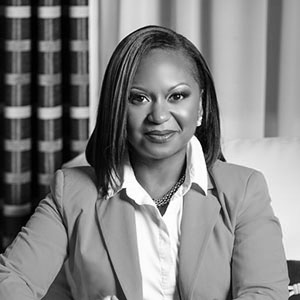
business schools can use their power to create leadership changes
By Endia M. DeCordova, Assistant VP for Development and Strategic Initiatives, UConn Foundation
What role do we play in creating environments that either support economic mobility or impede progress for black and brown students? Business schools are the training ground for future CEOs, board of directors, and hiring managers. They will have the power to open doors or close them. If today’s students do not have an appreciation for the inclusion of black and brown people, they will create economic systems that will ultimately hurt people of color.
A real commitment from business schools is needed. This can include examining racial biases within the school, being intentional in the recruitment and retention of students of color, aligning students with successful mentors of color, conducting a wage equity audit, and advocating for the adjustments needed to achieve fair and equitable pay for when students enter the workforce. This is a start that can create long-lasting change.
As a mission-driven fund development and communications executive, Endia DeCordova has raised millions of dollars to support institutions in building sustainable cultures of philanthropy. She earned an MBA from the University of Hartford and a bachelor of science degree in communications from Morgan State University in Baltimore.
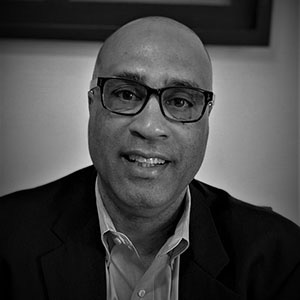
racial equality: are you partner? or a spectator?
By Barry McFarlane '78
The next generation of business leaders must embrace racial equity as mission critical. Business schools play a vital role in this effort. Curriculum and teaching methods must be refreshed to ensure students are prepared to meet the challenge. Graduates should enter the business world with a sense that, not only is striving for racial equity good for business, but it’s the right thing to do.
Today, companies can no longer sit on the sidelines, feeling secure in the position that they do not tolerate racism. Business leaders must now embrace action and strategies to combat racism, wherever it exists, but especially in the communities that buy their products or support their workforce. Real investment in effective strategies will be key, and will demonstrate whether you are a true partner in this movement, or just a spectator. I am encouraged by the scope of this movement and I know UConn can help lead the way.
Barry McFarlane earned a business degree from the University of Connecticut in 1978 and an MBA from Cornell University in 1982. A licensed CPA, he has spent the last 22 years serving the non-profit sector in a variety of financial management roles and Board assignments. A resident of northern Virginia, McFarlane enjoys writing and his work appears on his blog InSearchofJames.com.
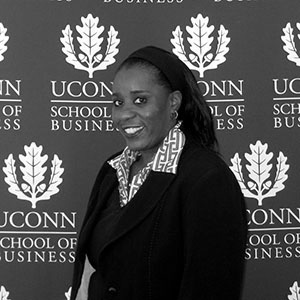
government reparations must be the clarion call
By Seanice Austin, Director of the Office of Diversity Initiatives, UConn School of Business
The racial wealth gap between Black and White households has remained relatively unchanged since the Civil Rights Act of 1964. While there were some efforts made toward narrowing the gap, those efforts have all but disappeared due to structural and institutional racism that continues to change tactics and move the bar.
Over the next several years, there is going to be a $30 trillion transference of wealth from the baby boomers to the younger generation, which will worsen the problem. At the root of all racism is a caste system, so to eradicate racism, we must eliminate the economic gap.
Business schools, especially land-grant institutions, have a responsibility to lend their voice to advocate at the state- and federal- level for passage of substantive legislation that focuses on economics. Black Americans who descend from American chattel slavery is the largest group of Blacks in this country. Reparations is a debt owed by the American government and must be the clarion call.
Seanice Austin is the School of Business’ Director of Diversity & Inclusion and has been an educator for 25 years in both the public and private sector. She serves on several high-school advisory boards and is currently the Economic Development Commissioner for the City of New London, Conn., and serves as Vice Chair on the Covid-19 Long-term Recovery Team, Health & Human Services subcommittee for New London.

let minority students, as young as middle school, know that a business career is an option
By Elizabeth "Lizzie" Turner '18, Associate Underwriter at Travelers
Let us talk about the heart. I know…that is a strange way to start a conversation about racism and business. But, the solutions to racism are multifaceted and complicated because racism results from what I call “heart matters.”
Some people’s hearts hold unaddressed biases or deeply entrenched views about the inferiority of minorities. These attitudes are not easily or quickly dismantled, so the task for business schools is to expand opportunities in the face of inequality.
One path to successful careers begins with the knowledge that business school is an option. More young minorities, as early as middle school, need to be made aware of the resources provided by business schools. With this awareness, more qualified people of color will attend business schools that will prepare them for and connect them to business opportunities with higher salaries, chipping away at the economic disparity between communities of color and their counterparts.
Elizabeth Turner is a 2018 UConn graduate from the Honors Program with a degree in business management. She is beginning her journey toward earning her MBA at UConn. She currently works as an Associate Underwriter at Travelers Insurance Co. in Hartford. She loves serving at her church, where she is very involved in the music and youth ministries.
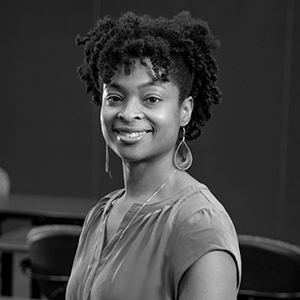
address a racist system that normalizes, perpetuates racial inequities
By Nicole Jones Young, '16 Ph.D., Assistant Professor of Organizational Behavior, Franklin & Marshall College
It is more than simply diversifying faculty, students, and staff, or including a diversity-related course in the curriculum. Business schools need to utilize their platform and partner with organizations to explicitly acknowledge that the system we—individuals, organizations, and institutions—operate within is racist, as it has normalized and perpetuated racial inequities.
To effectively move forward we must acknowledge and teach the compounded effects of slavery, Jim Crow, and mass incarceration. The racial wealth gap, differentials in compensation and inheritance, employment discrimination, and funding for entrepreneurial investments all relate back to the various policies and legislation created to continue the disenfranchisement of Black Americans.
Thus, recommendations to improve equity in areas such as college admissions, employment, and compensation are flawed, as they operate within the constraints of our current racist system. Corrective action must include education about race, contributions for reparations, and elimination of “race neutral” policies, which effectively maintain the status quo.
Nicole C. Jones Young earned her PhD in management from UConn in 2016, and was the first member of her family to obtain a doctorate. Her research is focused on the employment process for individuals with a criminal history, and organizational inclusion. She teaches courses in organizational behavior, human resources, and organizational inclusion.

create a culture where speaking up is taught, encouraged, supported
By W. Corey Moore '18, '20 MA, Higher Education Administration; former RA in UConn’s ScHOLA2RS
Representation matters. In order to begin the conversations necessary to eradicate racism and increase equal opportunity, diverse voices and perspectives must be engaged. It is imperative to continue working to increase the percentage of both African American and Latinx faculty through minority recruitment and retention programs.
Education matters. Being unaware can no longer be an excuse when it is possible to learn what you do not know. Business schools are positioned to implement their own learning and development plans for students and faculty by collaborating with campus diversity partners to foster dialogue aimed at understanding the history of system
atic racism and lack of equality.
Finally, inclusion matters. Creating spaces that actively support and empower marginalized groups must be a priority. For example, the establishment of an annual town hall on diversity to offer a means of assessment and accountability. This is not a short-term fix, but instead a long-term commitment if the goal is truly sustainable change and the creation of a culture where speaking up is taught, encouraged, and supported.
W. Corey Moore is currently a Financial Leadership Program (FLP) Associate at Raytheon Technologies. He is also a recent graduate of the University of Connecticut, where he earned both his B.S. in Finance and M.A. in Education. Within both his scholarly and professional work, Corey is known for his unwavering commitment to making sustainable change in the area of diversity and inclusion, particularly providing underrepresented groups with access to higher education and early career development.
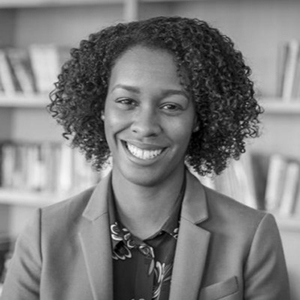
one idea: demand action from companies that want to recruit on campus
By Simone Hill '10, Diversity, Equity and Inclusion Strategist at Omidyar Network, a philanthropic investment firm
Business schools are responsible for developing the future leaders of the world, and not just in business. Business school grads are using their acquired skills to make a difference in government, nonprofits, the arts, and more. The reach and potential impact is vast. So how do business schools step into that responsibility?
• Intentionally attract and admit under represented minority (URM) students — Rethink admissions criteria to be more holistic and contextual. Reach out to Black communities to create a stronger pipeline of talent into business schools.
• Develop anti-racist leaders — Incorporate anti-racism training into the curriculum. Ensure faculty mem- bers are trained to lead equitable classrooms. Offer alums support and resources to develop their knowledge and skillset in leading anti-racist organizations.
• Model anti-racism and equity — Business schools continue to be predominantly White spaces both within the student body and faculty/staff. Hire more URM staff and professors. Give URM professors tenure. Bring in more URM lecturers. This can drastically change the culture of a business school in and out of the classroom.
• Stand with URM students, alums, staff, and faculty in this fight — Scrutinize how and where the school’s money is being spent. Demand more action from the companies that want to recruit students on campus.
Simone Hill is a diversity, equity and inclusion (DEI) strategist with experience spanning across private, nonprofit, and academic sectors. She currently leads the execution of DEI initiatives at Omidyar Network and manages the organization’s new portfolio of grants focused on pluralism and racial justice. Hill earned her bachelors degree, with a major in finance from UConn and then an MBA and MA in education from Stanford University.
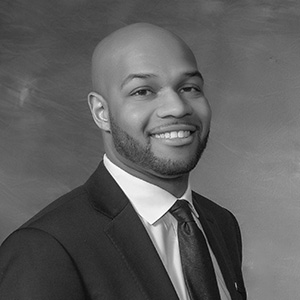
with only four black CEOs at fortune 500 companies, universities, businesses must fight for inclusion
By Armond Hodge ’16 MBA, Finance Manager at ADP
Academic institutions, not just business schools, must come together and show an appreciation and acceptance for the inclusion of Black people; not just for student athletes, but the entire student body, as well as faculty and staff leadership. When we look at the Fortune 500, there are only four Black CEOs. Institutions and partnering organizations must do a better job at bridging the gap and creating opportunities, resources and networks for Black students to attain these leadership positions.
It is no longer, and should never have been, enough to just say you don’t stand for racism. We must not only speak out against it, but we need to implement sustainable policies and procedures that both fight
systemic racism and promote equal opportunity and inclusion. We must commit ourselves to “leveling the playing field” in both education and our respective workplaces, while holding ourselves accountable in doing so.
Armond Hodge ’16 MBA is currently at ADP in its Product and Technology Finance team. Prior to joining ADP, Hodge worked for Gartner, and held various roles in its finance organization. While enrolled in UConn’s Full-Time MBA Program, he was inducted into the School of Business Hall of Fame. He is an active and current member on the School of Business Dean’s Advisory Cabinet.
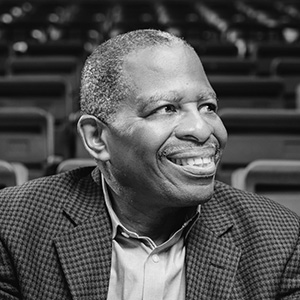
lessons from The Consortium can establish a foundation for moving forward
By Patrick "Pat" Harris ’70, former Vice President and CFO, Los Angeles Lakers; Financial Consultant
A lot can be learned from the history and the success of The Consortium (The Consortium for Graduate Study in Management: cgsm. org). Founded in 1966, over 50 years ago, the program was formed to increase the number of African American men who enrolled in MBA programs, and give them the business skills they needed to secure positions in American corporations.
Starting with 21 students and three universities, the program has now over 20 member universities and has assisted over 10,000 African American, Hispanic American, and Native Americans, both men and women, achieve their educational and career goals.
I recommend that business schools follow the Consortium’s model and start their recruitment and outreach process at the grade-school level. They should also align themselves with organizations serving underserved communities, and have business school faculty and students regularly speak to young students about career opportunities afforded by the business schools.
In 2001, Patrick Harris was inducted into the UConn School of Business Hall of Fame in recognition of his accomplishments since earning his bachelor’s degree in accounting in 1970. He also earned an MBA from Indiana University. During his tenure with the Lakers in the 1980s, he became the highest ranking African American financial officer in professional sports. In addition to working as an entrepreneur and consultant, Harris has taught at the college level in California. He has served on the board of many community organizations, including as a board member and Chief Operating Officer of the LA Urban League.
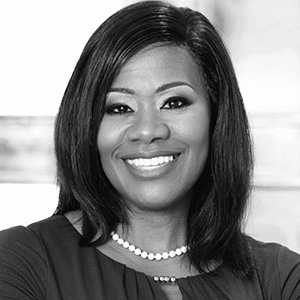
develop future business leaders who are empathetic, committed to eradicating racism
By Medina Jett ’08 MBA, Founder and CEO of Integrated Compliance Solutions Group
The opportunities for business schools to impact economic and racial inequalities are vast. Several steps that I would recommend for consideration are: 1) Hire more Black professors; 2) Educate your faculty to foster more open discussions around race and equality in business; 3) Establish more equitable admissions requirements that enable more Black students to attend; 4) Incorporate case studies that are centered on Black protagonists; 5) Establish a mandatory course focused on the history of African Americans in this country and the economic disparities that resulted.
Business schools are in a position to serve as stewards for change by producing future business leaders who are more empathic and committed to eliminating economic disparities and eradicating racism.
Medina Jett is a graduate of UConn’s Executive MBA program, an attorney, an entrepreneur, and the President of Jett Speaks, an empowerment firm that helps organizations sharpen their focus on eradicating racial inequality.
what's your answer?
These essays and ideas are just the beginning of a larger discussion—at the School of Business and across the university—of how we can enhance the experiences that we offer our Black students and support them on their career journeys as alumni. We look forward to hearing your thoughts on this very important topic. Post your answer on social media using the hashtag #UConnEqualVoices, to this question: How can business schools serve as an instrument for the economic changes necessary to eradicate racism and increase equal opportunity?
#UConnEqualVoices